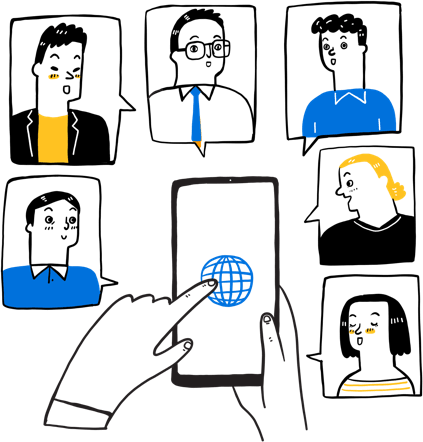French class in Chennai
August 28, 2023 2023-12-12 8:56French class in Chennai


French Language Classes in Chennai

Why learn French with us?
Learnlanguages.store offers in-person and online groups, French classes, for adults at all levels, from total beginner to advanced conversation. Taught by professional native French teachers, these classes are a great way to meet fellow French learners and strengthen your French language skills. Our French group classes meet twice a week for 120 minutes and are offline at our Chennai branch. You can also learn Online on our iOS, Android or website this allows you to join one of our popular groups from anywhere in the world. Our focus on conversational French will have you using and speaking the language from your very first lesson, and our building-block approach to structure and grammar will help you learn French in a fun, student-centric environment. We also offer regular French language workshops and pronunciation boot camps for students looking for a taste of the language and culture.
Learn The Essential Skills
Earn Certificates And Degrees
Customised Courses
Top rated
French courses taught by the world's Best French teachers
₹32,600.00₹42,600.00
French DELF B1
₹24,300.00₹32,600.00
French DELF A2
₹18,300.00₹24,300.00
French A1

Courses from professionals around the globe.
Get teamed up with the specialists who work and teach languages for years at famous universities.

Top Rated class
We are a top-rated language school teaching French in Chennai and nationwide. Group and private lessons, adults and kids, schools, corporate, or film -no matter your level, we can help you achieve your French language goals.

Online and offline learning
Learn on our IOS or Android mobile app or on our website. It has most advance language learning tools.

Flexible Scheduling
We offer flexible scheduling for both groups and private lessons, allowing you to start your French classes at any time and at your convenience. You can have them online or offline. We want to help you learn French in a fun, engaging, and encouraging environment.

Amazing learning Environment
A perfect environment that helps you learn more effectively compared to traditional classroom methods.

Intensive Learning
Our lessons are tailored to your specific goals and schedules, allowing you to learn French at the speed and level that suits you. These are Best for targeted needs, such as applying for work in French , business French , or graduate school entrance exams
Frequently Asked Questions About French Courses

Why learn French?
Here are 7 reasons to learn French:
1. French is the only language other than English spoken on five continents.
2. To this day French as a foreign language remains the second most frequently taught language in the world after English.
3. French is one of the official language of all United Nations bodies as well as of numerous International Organizations (including The International Labor Bureau and the International Red Cross)
4. Despite different origins (English is Germanic language while French is a Romance language) over 40% of English vocabulary comes from French. Learning French may thus help you improve your English (especially if you are not a native English speaker)
5. To be able to communicate while traveling in France. France remains the leading tourist destination in the world.
6. Discover French Cinema without relying only on (sometimes poor) subtitles. French cinema is rich and varied.
7. Discover French literature without relying only on translation. French literature is still considered as one of the world’s most brilliant and is best discovered in the original text. Note that French literature is not limited to France Literature. Indeed, numerous French-language authors from outside France including Tahar Ben Jelloun (Morocco), Amin Maalouf (Lebanon) or Amelie Nothomb (Belgium) are also well worth discovering and have contributed to the richness of French literature.
What are the most challenging aspects of the DELF and DALF exams?
Each student may find different aspects challenging, but the areas most find a challenge include pronunciation and grammar, especially:
- Tenses and tense concordance in subordinate phrases
- Articles, complements and pronouns
- Active/passive and the subjunctive
- Verbs that take the subjunctive
- Verbs that take avoir or être
However, there’s no need at all to worry – these are all areas we cover at length in our preparation courses and your teacher will guide you through them all so you go into the exams with lots of confidence.
How many people speak French?
Learning French is not only useful in France but Belgium, Switzerland, Quebec in Canada and one of the widely popular languages in Africa. So if you are speaking English and French, you are communicating throughout most of the continent . Native language to over 110 million speakers and a further 190 million speaking it as a second language says a lot about the reach of the language. Studies by different governing bodies say that 2025, it will be spoken by almost 500 million people overtaking English in popularity. You’ll be surprised to know that French is the only language, alongside English, that is taught in every country. French Government has always been enthusiastic about operating international network of cultural institutes. They run French-language courses and regular learning classes for close to a million learners all around the globe.
Besides France and its overseas territories, 29 other countries have French as one of their official language:
1. Belgium
2. Benin
3. Burkina Faso
4. Burundi
5. Cameroon
6. Canada
7. Central African Republic
8. Chad
9. Comoros
10. Congo (Brazzaville)
11. Congo (Kinshasa)
12. Côte d’Ivoire
13. Djibouti
14. Equatorial Guinea
15. Gabon
16. Guinea
17. Haiti
18. Luxembourg
19. Madagascar
20. Mali
21. Monaco
22. Niger
23. Rwanda
24. Senegal
25. Seychelles
26. Switzerland
27. Tahiti
28. Togo
29. Vanuatu
While not an official language, French is also widely spoken in some other countries including Morocco, Tunisia, Algeria, Mauritania and Lebanon.
Is French a great career move?
Get to know French along with English and it will provide you with an edge and advantage in the international job market.
It will open new doors for you to French companies in France and other French-speaking parts of the world. It’s world’s one of the most important economies and a favoured destination for foreign investment.
Knowing French can help you gain a richer and well-rounded education. Some of world’s top universities are in France and knowing French helps to overcome the challenges of studying in France. Knowledge of a foreign language helps in a not so familiar environment and will make you stand out when you begin applying for jobs .
The impressive line-up of organisations where French is used officially is known to the world. French is a working as well as an official language of the United Nations, the European Union, UNESCO, NATO, the International Olympic Committee, the International Red Cross and international courts.
Don't believe unsubstantiated claims about learning french? Read on for the evidence...
- Forbes reports that French is the language of the future, according to a study by Natixis investment bank projecting French will be the “most-spoken language in the world” by 2050. Read the article and think about the study’s methodology, to see if you agree with the bank’s analysis. Read article
- ABC News reports that according to Bloomberg Rankings, French is the second most useful language in the world for business. Read article
- Inside Higher Ed reports that French majors made far larger gains during college than students in other majors, in their writing, analytical, and critical thinking skills, as measured by the CLA (Collegiate Learning Assessment). Read article / Read analysis for possible explanations
- Newsweek reports a French major as one of the top ten most useful majors “according to science.” “Useful, for our purposes, is defined by majors most likely to lead to less unemployment and higher earnings, and which are in industries projected to grow in the next decade according to research from Georgetown University and data from the Bureau of Labor Statistics.” Read article.
- Now more than ever, French speakers are in hot demand across all Peace Corps assignment sectors (Environment, Agriculture, Health, Business, Education, and Community/Youth Development), where French is considered a “scarce skill.” Email peacecorps@virginia.edu with questions, and check out www.peacecorps.gov.
- According to the US Census Bureau, French is the third most spoken language in the US other than English. See statistics
- Applicants for assistant professorships in French departments at colleges and universities regularly test the applicants’ French language skills. If they are not good enough at speaking the language, they are not considered for the position. Read article
- NPR’s Steve Henn highlights “Utah’s secret weapon” for job creation: “Utah happens to have the highest percentage of foreign-language speakers in the country. It’s the state’s secret economic weapon.Every year, thousands of Mormon missionaries come back to Utah after spending two years abroad, learning a foreign language, foreign customs and intricacies of a foreign culture.” Listen to story
- Robert Lane Greene, a business correspondent for The Economist, explains why he thinks French (not Mandarin) is the most useful language to learn for business. Read article
- Bilingualism makes you smarter, says new research reported in the New York Times. Read article.
- Learn French and protect your brain! Bilingualism protects the brain from age-related decline, reports the BBC, referencing a study published in the Annals of Neurology. Read article.
- There is an association between living abroad and creativity, say William Maddux, an assistant professor of organizational behavior at INSEAD and Adam Galinsky, the Morris and Alice Kaplan Professor of Ethics and Decision in Management at the Kellogg School The longer the time spent abroad, the higher the scores on creativity tests, their study found. Read article.
- Why do foreign language majors make such gains in critical thinking skills, compared to other majors? In attempting to explain this, scholars at Kalamazoo College suggest that “second language learning might enhance competency in the native language as well as critical thinking and problem-solving skills […because of] four attributes—metalinguistic awareness, critical reading, critical thinking and problem solving, and cross-cultural literacy—that receive explicit and regular attention in language courses and that may contribute to better performance on tasks like the CLA (Collegiate Learning Assessment).” Read article.
How many levels are there in French?
At Learnlanguages.store we have 6 levels in French.
- Basic ( DELF A1 )
- 2. Elementary ( DELF A2 )
- Intermediate ( DELF B1 )
- Advanced ( DELF B2 )
- Proficiency ( DALF C1 )
- Mastery ( DALF C2 )
What is DELF?
DELF (Diplôme d’études en langue française) is the official diploma of French language awarded by the French Ministry of National Educational.

It is conducted to test the French language proficiency of non-native speakers. This exam is administered by the International Centre for French Studies on behalf of France’s Ministry of Education.
The DELF certificate is suitable for language learners of all levels, and there are a number of purposes for which students usually take the exam.
If you wish to study a bachelor’s degree at a French university, you have to pass DELF B2 for entry into the first year.
If you wish to enter the INBP (National Institute of Bakery and Pastry), you’ll sit an entrance exam that is similar to the DELF B2 exam, so a DELF preparation course is a suitable and helpful option.
In Switzerland, some jobs in the public sector require certain levels of DELF.
The DELF diploma covers the first four levels of the Council of Europe’s Common European Framework of Reference for Languages (CEFRL):
Levels A1, A2, B1 and B2, from elementary to upper intermediate.
About Exams
You’ll take an exam for each of the four levels A1, A2, B1 and B2. Each exam tests you on four areas, covered in different papers:
- Reading (marked out of 25)
- Writing (marked out of 25)
- Speaking (marked out of 25)
- Listening (marked out of 25)
Exams are marked out of 100. To pass any of the levels, you must score 50/100, with a minimum score of 5/25 in each area.
In the DELF speaking exams, you have 30 minutes to prepare a well-presented and argued presentation about a topic. After you’ve given the presentation you will be asked questions about it.
In total across the four papers, DELF exams last:
- DELF A1: 1 hour 20 minutes
- DELF A2: 1 hour 40 minutes
- DELF B1: 1 hour 45 minutes
- DELF B2: 2 hours 30 minutes
DELF Diploma is widely recognized in about 165 countries and valid for lifetime.
What is DALF?
DALF stands for Diplôme approfondi de langue française (Advanced diploma in French language). As an official state-issued diploma, DALF is recognised all over the world.
The DALF certificate is useful to anyone wanting to pursue higher education studies in France or in French, as it certifies you have the required language skills and you won’t need to take a separate language test.
The DALF diploma covers the last two levels of the Council of Europe’ s Common European Framework of Reference for Languages (CEFRL): levels C1-C2.
If you’re planning on applying to study a master’s degree at a university in France, you have to pass DALF C1.
It’s also open to you if you simply want to improve your French for pleasure – and if you enjoy working autonomously, you’ll really enjoy this course.
DALF is also often the diploma of choice for anyone wanting to get a job in large companies where employees are expected to be fluent in French, which is the case in many large Swiss companies, for example.
In Switzerland, there are also certain public-sector jobs for which you need to attain a certain level of DALF.
About Exams
You’ll take an exam for each of the two levels C1 and C2.
The C1 exam tests you on four areas, covered in different papers:
- Reading (marked out of 25)
- Writing (marked out of 25)
- Speaking (marked out of 25)
- Listening (marked out of 25)
Exams are marked out of 100. To pass either level, you must score 50/100, with a minimum score of 5/25 in each area.
In the DALF speaking exam you have 60 minutes to prepare a well-presented and argued presentation about a topic. After you’ve given the presentation you will be asked questions about it.
The C2 exam is slightly different and combines linked skills as follows:
- Reading and writing (marked out of 50)
- Speaking and listening (marked out of 50)
To pass this exam, you must also score 50/100.
In total across the four papers, DALF exams last:
- DALF C1: 4 hours
- DALF C2: 3 hours 30 minutes
What is TEF?
TEF is an international benchmark test that measures your level of knowledge and skills in French. TEF Exam was Created in 1998 by the Paris Ile-de-France CCI, the Test d’Evaluation de Français.
If you’re looking to immigrate to Canada , Quebec or France At that point you can’t stand to miss Test d’ Evaluation de Français (TEF) Exam Test.
Learnlanguages.store in Navi Mumbai is the centre which conduct the Course preparation for the TEF.

How long do the DELF preparation courses last?
Our courses last from 4 weeks upwards and you can tailor them to fit in a number of hours to suit you. We provide online and offline training.
How long do the DALF preparation courses last?
Our courses last from 4 weeks upwards and you can tailor them to fit in a number of hours to suit you. Not everyone can spend a month or longer studying in France so we also offer an online and offline course in Navi Mumbai – although the exam itself is taken in Rouen so you do need to go to France eventually!
What are the key differences between DELF and DALF?
Essentially, they certify you for different levels of ability. DALF, standing for Diplôme approfondi de langue française, or Advanced diploma in French language, shows you have reached a more advanced level of French language learning.
Together, DELF and DALF cover the six levels of the Council of Europe’ s Common European Framework of Reference for Languages (CEFRL) from A1-C2.
While DELF corresponds to levels A1-A2 and B1-B2 (elementary and intermediate), DALF corresponds to levels C1-C2 (advanced).
The exams at each level all differ, but they cover four areas:
- Listening
- Speaking
- Reading
- Writing
DELF A1-B2 and DALF C1 exams all have one section on each of the above areas, but DALF C2 is different and combines listening and speaking in one section and reading and writing in another.

See What Our Students Have To Say
I took my Korean lessons from Learnlanguages.store while preparing for TOPIK exams. The first 2 levels went by fun and easy. The third level took some time but it got... read more completed on a satisfactory note. Really good trainers for all levels of Korean language courses. Well designed Korean courses by expert faculty and the staff is cordial too. Having completed my Korean coaching from Learnlanguages.store, I can now say that it's one of the best Korean language institute in Vashi Navi Mumbai. Detailed Korean classes. Go its Korean language classes. Highly recommended based on my experience.
August 22, 2022
Very helpful and nice teaching and techniques to teach foreign languages
July 22, 2022
Best app I have ever come across
January 22, 2022












